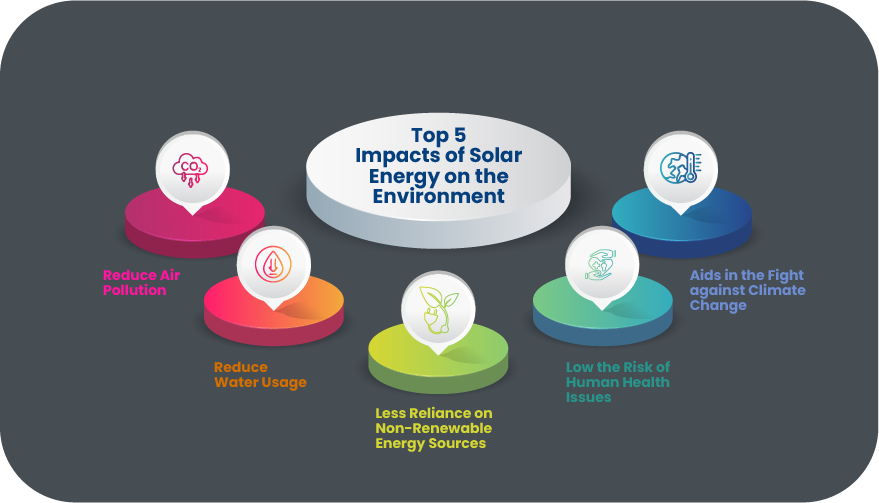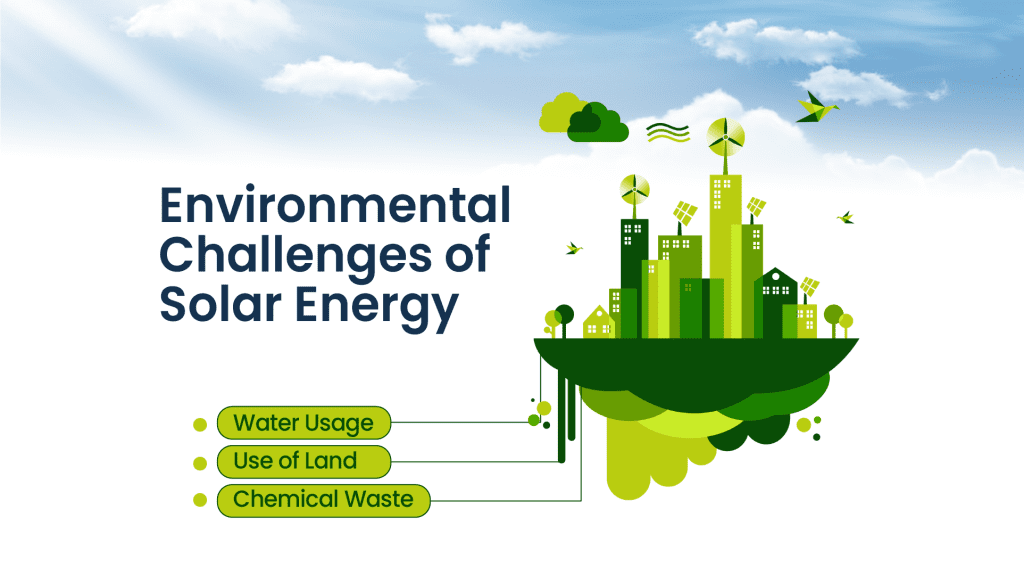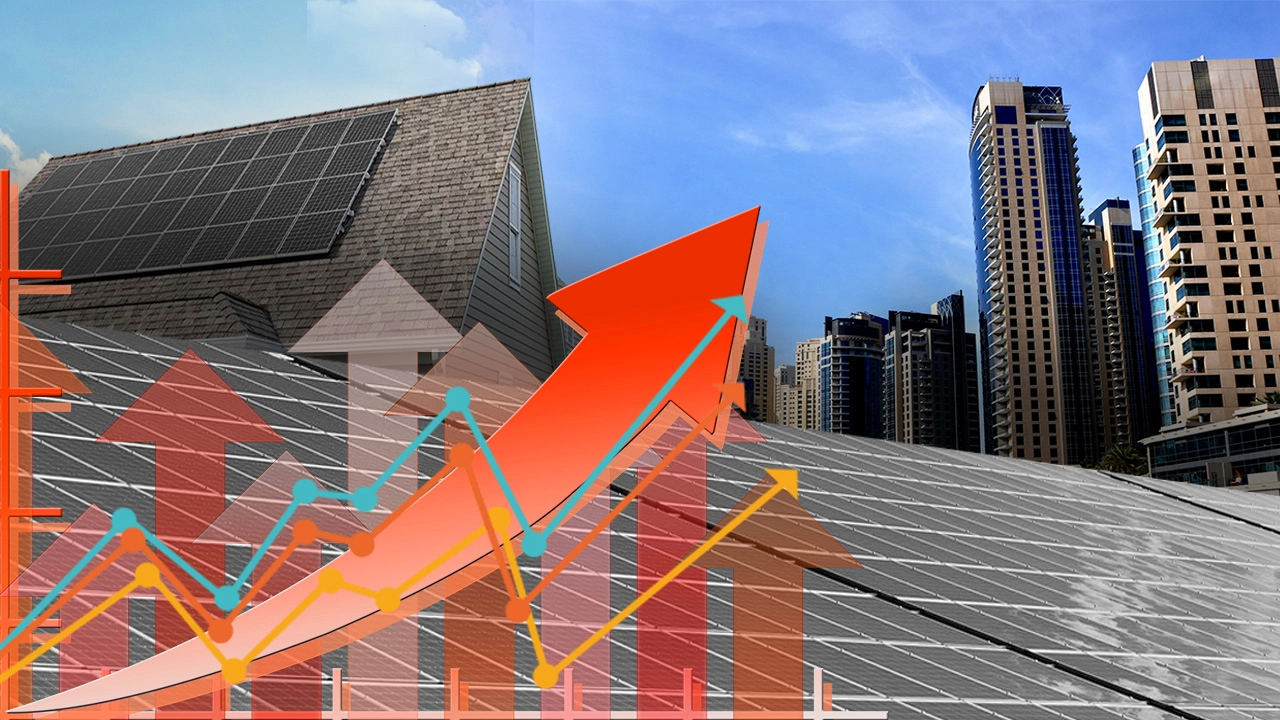- Published On:
Environmental Impacts Of Solar Energy: The Benefits Of Solar On Earth
Ever wonder why people choose solar energy for their homes and businesses? Of course, the financial benefits of solar come first. There are many ways to save with solar, including a 30% extended tax credit. The environmental benefits are the second most popular reason. Most of the power produced in the United States comes from the burning of fossil fuels such as coal and natural gas. In contrast, solar panels generate clean, renewable, and emission-free electricity. This clean power lightens up your home without releasing any carbon dioxide or air pollutants into the atmosphere.

In this article, we will highlight some environmental impacts of using solar energy resources for power generation. This article will also explain how you can contribute to an eco-friendly environment and save resource by installing home solar systems for power generation.
What Are The Top 5 Impacts Of Solar Energy On The Environment?
In the U.S. the trend of going solar is also booming. More homeowners are now willing to install solar panels in their homes due to the increasing energy costs. By installing a PV system, they can save thousands of dollars each year. There are many benefits of choosing solar nowadays for homes. But the main concern that urges people to switch is the environmental impacts of solar energy.
Reduce Air Pollution
Smog, impure air, and other pollutants are harmful to the environment, your health. Instead of using fossil fuels to produce electricity, solar energy significantly reduces greenhouse gas emissions, particularly CO2. This causes climate change and rising global temperatures, which in turn lead to serious environmental and public health problems. Every year, dangerous and more frequent wildfires give the majority of residents a direct view of the devastation that these greenhouse gases do.
Going solar lowers your carbon footprint while reducing the need for fossil fuels and the number of greenhouse gases that are discharged into the atmosphere.

Reduce Water Usage
If an energy source doesn’t require fossil fuels to generate electricity, it most likely depends on water. Both hydropower and nuclear energy utilize a lot of water to generate electricity. Damns, constructed to regulate water flow and energy generation, may harm the ecosystem in the area. However, Solar panels harness the power of the sun to produce energy without using water or harming the environment.
Less Reliance on Non-Renewable Energy Sources
Going solar is a first step towards an energy-independent home. Solar energy is a great alternative to the burning of air-polluting fossil fuels, as it helps lessen our dependence on nonrenewable energy sources.
For our environment and future generations, the quicker we switch to renewable energy, the better.
Low the Risk of Human Health Issues
Cleaner, healthier lungs result from breathing in cleaner air. According to the US Agency for Energy Efficiency & Renewable Energy, improved air quality can improve human health. Also, it can result in the saving of more than 25,000 lives.
Aids in the Fight against Climate Change
It becomes more challenging to breathe clean air as pollutants and CO2 are continually released into the atmosphere. The amount of heat absorbed by our planet will increase along with the amount of carbon that is stored in our atmosphere. As a result, different regions’ climates will continue to be impacted, with some seeing major warming or cooling as well as an increase in sudden and deadly storms and weather patterns.
To help mitigate the harmful consequences of climate change, scientists and climatologists have generally agreed on sustainable energy sources. Solar energy is one of those approaches since it can help lower CO2 emissions and atmospheric pollution.
What Are The Environmental Challenges Of Solar Energy?
Solar has certain negative environmental effects too. The solar mining and manufacturing processes are the main ecological worries. Fortunately, the solar industry is now taking on these difficulties head-on. Some of the challenges include:
Water Usage
Even though solar panels don’t require water to generate electricity, water is used in the manufacturing and recycling of solar-panels, as well as in utility-scale solar-power generation facilities. However, Solar thermal plants (CSP) use hybrid and wet-recirculating technology to mitigate this and lower overall water use. Better yet, scientists are exploring new solar techniques to reduce the amount of water for new solar panel production.
Use of Land
Environmental activists are raising concerns regarding habitat loss and land degradation as the result of the construction of huge solar farms. Solar panel farms often appear to be a “waste” of land because they have considerably less agricultural space than wind facilities, which may coexist with crops. Since solar can produce electricity anywhere the sun shines, researchers are looking

into ways to reduce the impact on the environment by locating solar farms in less popular locations, such as brownfields, dead mining sites, or already-existing transportation and transmission routes. However, some who support solar energy claim that by installing more solar panels on the roofs of homes and businesses, this “waste” of land could be minimized.
Chemical Waste
Sand with a high concentration of quartz must be transformed into polysilicon to make solar panels that can absorb light and produce power. Sadly, silicon tetrachloride, a hazardous byproduct of the chemical reaction that forms this polysilicon, is also produced. Silicon tetrachloride can produce toxic fumes and soil acidification if it is not properly disposed of. Interestingly, by turning silicon tetrachloride back into polysilicon, we can reduce the amount of remaining waste. The National Renewable Energy Laboratory (NREL) of the U.S. Department of Energy is investigating alternate production techniques that completely avoid silicon tetrachloride, and solar manufacturers in China are legally working to recycle at least 98.5% of the silicon tetrachloride waste they produce.
Is Solar Energy Good For The Environment?
Overall, the use of solar energy for power production has some considerable positive environmental impacts. Choosing solar is the best, sustainable and eco-friendly option to lighten up homes. Going solar not only saves you money but also helps you to contribute towards a clean environment. Selecting solar is as following the change for positive movement towards protecting the earth. Also, a reduction in fossil fuel emissions can help our world slow down global warming and improve air quality by switching to solar and other renewable sources.
Moreover, many environmental advantages of solar energy use include decreased resource stress and air pollution. Solar panel systems still have some unfavorable environmental effects, but experts in the industry are working hard to find solutions and more environment friendly ways to use and implement new solar technologies.
Related Articles:
With increasing inflation, even solar energy costs are a major concern for homeowners and also for the solar energy industry. We will discuss strategies to switch to solar with affordable options and maximize the benefits of their solar investment.
Solar power is not just the cleanest; it’s the most abundant energy source on our planet. It’s estimated that the entire United States could be powered with about 22,000 square miles of solar panels.
Solar energy is an eco-friendly substitute for fossil fuels, which release greenhouse gasses that cause climate change. Solar energy is growing in popularity.



